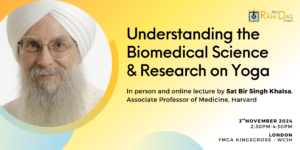
- This event has passed.
Understanding the Biomedical Science and Research on Yoga
November 3, 2024 @ 2:30 pm - 4:30 pm
Explore the biomedical evidence on how yoga works, its clinical trials, and the impact of yoga research on society and modern healthcare.

Understanding the Biomedical Science and Research on Yoga
In person and online lecture with Sat Bir Singh Khalsa.
In easy-to-understand language, this workshop/lecture will present an overview of modern biomedical research on yoga with special attention to Kundalini Yoga. We will review the biomedical scientific evidence for how yoga works, the clinical trials research, and the value and implications of yoga research for society and in modern healthcare. Yoga teachers/practitioners will gain an appreciation of how the published yoga research can help with getting yoga classes into public venues, workplaces, fitness centers, schools and healthcare institutions.
Whether you’re a yoga teacher or just curious about the science behind it, this event is perfect for anyone interested in wellness and benefits of yoga. Don’t miss out on this opportunity to deepen your understanding of yoga from a scientific perspective!
Please book your ticket in advance.
Pricing
Please select your own pricing tier. Choose the one that you can afford that also says ‘I value the opportunity to attend this event.’
£30, £20, £15.
A limited number of free tickets have been reserved for GRDP Members and Teachers. Please contact info@grdp.co.uk for more information.
All monies raised will go to good causes: the Guru Ram Das Project and Sat Bir Singh’s work on research and yoga.
More about Sat Bir Singh Khalsa
Sat Bir Singh Khalsa, Ph.D. is the Director of Research for the Kundalini Research Institute, a Research Associate at the Benson Henry Institute for Mind Body Medicine, a Research Affiliate at the Osher Center for Integrative Medicine, and an Associate Professor of Medicine at Harvard Medical School at Brigham and Women’s Hospital. He has conducted research on yoga and yoga therapy since 2001 and has been a practitioner/instructor of Kundalini Yoga 1973. His research has evaluated yoga for insomnia, chronic stress, and anxiety-related disorders, and also in workplace and public school settings. He works with the International Association of Yoga Therapists promoting yoga research as scientific director for the annual Symposium on Yoga Research and as editor-in-chief of the International Journal of Yoga Therapy. He is medical editor of the Harvard Medical School Special Report Introduction to Yoga, and chief editor of the medical textbook The Principles and Practice of Yoga in Health Care.
